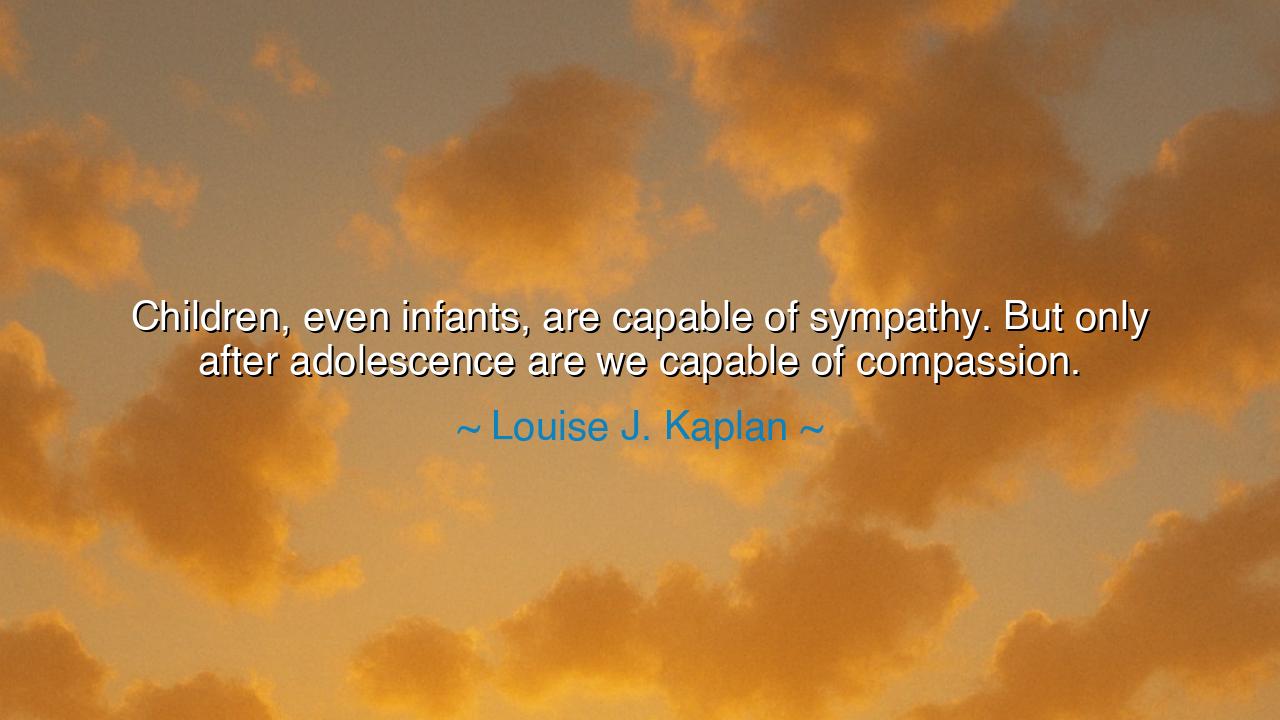
Children, even infants, are capable of sympathy. But only after
Children, even infants, are capable of sympathy. But only after adolescence are we capable of compassion.






Listen well, O children of the future, for the words of Louise J. Kaplan carry deep wisdom about the growth of the human soul: "Children, even infants, are capable of sympathy. But only after adolescence are we capable of compassion." These words are a reflection on the nature of human development and the evolving capacity of the heart to feel for others. Sympathy—that innate response to the suffering of others—is something we feel even in the earliest stages of life. Yet, it is only through the journey of adolescence—the turbulent yet transformative years—that we learn the deeper, more complex emotion of compassion, an emotion rooted not just in feeling for others but in taking action to alleviate their suffering.
In the ancient world, O children, the philosophers recognized the progression of the soul. Aristotle spoke of the cultivation of virtues, how the soul must mature through practice and experience. He understood that sympathy, the ability to feel another’s pain, was a natural gift, but that it was the virtue of compassion—the active desire to relieve that pain—that was earned. Compassion requires more than just recognition; it requires the will to help, the courage to act, and the maturity to understand the complexities of another's suffering. Kaplan’s words echo this ancient wisdom, reminding us that the journey from sympathy to compassion is the mark of human growth.
Consider, O children, the tale of Hercules, the mighty hero of Greek myth. As a child, Hercules was capable of sympathy—he felt for the suffering of others, and his heart swelled with kindness. Yet it was not until he entered adolescence and began his famous labors that he truly understood compassion. His trials were not simply about fighting beasts or completing tasks; they were about confronting great moral challenges, understanding the pain of others, and taking on responsibility. Hercules’ journey from sympathy to compassion is a journey of the soul, one that we all must take. Compassion, like the hero’s strength, is not born in an instant, but grows through the experiences and challenges we face.
In the same way, Nelson Mandela—who spent his youth filled with anger and sympathy for the suffering of his people—only truly understood compassion after years of hardship. It was in the years of his imprisonment, when he experienced suffering and came to understand the depth of others' struggles, that Mandela learned to forgive, to show mercy, and to act for the greater good. Mandela’s maturity, gained through the crucible of adolescence and the trials of his adult years, led him to a compassionate vision for the future of South Africa, one that sought to heal wounds rather than perpetuate them. His compassion was not an innate response, but a hard-earned virtue, developed through years of self-reflection, suffering, and growth.
Kaplan’s words also bring us to the crucial idea that compassion is not merely an emotional reaction; it is a moral action. As adolescence ushers in the development of critical thinking, it also allows us to understand the complexities of the world—to grasp that others’ suffering is not always simple or straightforward. To move beyond sympathy to compassion requires us to understand the root causes of pain and to act in ways that do not just acknowledge it, but seek to transform it. It is the journey of a person who no longer just feels sorrow for another but works toward a better world through kindness, justice, and mercy.
The lesson, O children, is one of great depth. Sympathy is the starting point, the natural response to the pain of others. It is the spark that lights the fire of compassion. But compassion—that profound and selfless action—is what changes the world. Just as Hercules faced his trials and Mandela his struggles, so must we take the challenges of our own lives and turn them into opportunities to act for the greater good. Compassion requires action—not just feeling for others, but working to make the world a better place for them. It is through adolescence, that time of learning and growth, that we come to understand our responsibility to others, and it is in our adult years that we must apply that knowledge in service to the world.
In your own lives, O future generations, remember that compassion is something that must be nurtured. Begin with sympathy, but never stop there. Understand that the road to true compassion is long and requires action. Whether it is through small acts of kindness or larger efforts toward social change, let compassion guide your choices. Know that as you grow, you will be called not just to feel for others, but to lift them up, to ease their burdens, and to make the world a more just and compassionate place. In this, you will fulfill your truest calling—to act with both heart and purpose, to create a world where the suffering of one is the suffering of all.






AAdministratorAdministrator
Welcome, honored guests. Please leave a comment, we will respond soon